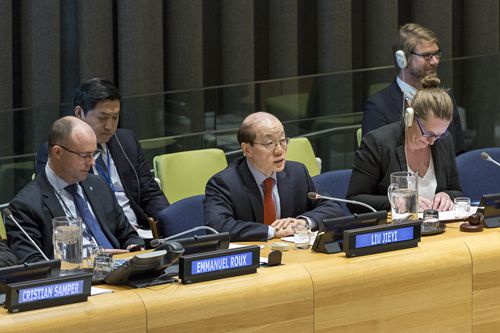| Statement by Ambassador LIU Jieyi at the High-level Thematic Discussion on the Global Observance of World Wildlife Day 2017 |
| 2017-03-03 06:02 |
|
Madam Moderator Distinguished guests, Today is the World Wildlife Day and the theme of this year is "Listen to the Young Voices". This high-level thematic discussion on the protection of wild flora and fauna at the initiative of President Thompson of the General Assembly is of great significance to raising awareness among the general public, youth in particular, of the need to protect wildlife, and to promoting sustainable economic, social and environmental development. I am convinced that this thematic discussion will bring new dynamics to the global efforts to protect wildlife. Wild flora and fauna are an important and integral part of the eco-system, greatly contributes to the wellbeing of mankind in terms of ecology, genetics, social and economic development, science and education. Protecting them means protecting the common homeland of mankind. In September 2015, the UN Sustainable Development Summit adopted the 2030 Agenda for Sustainable Development, which provides for the protection and restoration of land eco-system and the promotion of its sustainable use in an effort to reverse the loss of bio-diversity. The international community needs to strengthen its efforts in the following areas: First, step up efforts to combat illegal trade in wildlife. All countries must pay high attention to this matter and severely punish the perpetrators of this serious crime. What's required is enhanced law enforcement throughout the entire process, from production to marketing to trafficking, in order to combat illegal transaction in all its aspects. In particular, illegal on-line wildlife trade must be cracked down. As the saying goes, "No trade, no killing." Countries should address the root causes and remove the market driving forces leading to poaching and illegal trading of wildlife. Second, implement comprehensive policies for the purpose of all-round protection. All countries should drive economic and social development via ecological development and encourage green development and green life style. Creating job opportunities, eradicating poverty and improving livelihood will help reduce poaching. It is necessary to explore, in light of national conditions, such practices as establishing nature reserves or promoting wildlife eco-tourism to protect and manage wildlife resources in an effective and sustainable manner. It is also necessary to educate the public on eco-civilization and raise their awareness of wildlife protection so that they will voluntarily boycott illegal trading. Third, deepen international cooperation in wildlife protection. All countries should fully implement the Convention on International Trade in Endangered Species of Wild Fauna and Flora and the relevant UNGA resolutions, and honor their obligations in this regard. Countries should strengthen international cooperation in law enforcement to effectively track down, tackle and dismantle illicit wildlife trading networks and break the chain. Countries should conduct joint training, information sharing and other forms of law enforcement cooperation to combat illegal wildlife trade and protect wildlife. Meanwhile, government agencies, international organizations and the private sector should be brought in for enhanced synergy. Madam Moderator Distinguished guests, The Chinese government attaches great importance to the protection of wildlife. China has established Nature Reserves and Natural Forest Protected Areas. Through these key projects, China has gradually established its wildlife protection regime with Nature Reserves as the mainstay. Such practices have greatly improved the habitat of wildlife. China has been working to improve legislation and law enforcement coordinating mechanism, strengthen regulatory measures and further enhance wildlife protection. Our efforts have produced good results. It is clearly indicated in China's 13th Five-Year Plan that the concept of "innovative, coordinated, green, open and shared development" will guide our work in implementing bio-diversity protection projects, strengthening management of import and export of wildlife, and forcefully combatting illegal trade of wildlife such as ivory tusks. Since 2015, China has adopted measures to prohibit import of manufactured goods and hunting mementos made from ivory tusks and antique ivory tusks. By the end of 2017, China will close down domestic commercial processing and sale of ivory tusks and manufactured goods made from ivory. In recent years, China has taken an active part in international cooperation in wildlife protection. Through a number of international cooperation projects, China has provided assistance to some Asian and African developing countries, including providing better law enforcement equipment for wildlife protection and personnel training, with a view to improving the capability of developing countries of managing and protecting wildlife. Eco-civilization bears on the well-being and future development of mankind. We are ready to join hands with the international community to build a community of shared future of the entire mankind and work together for a beautiful homeland based on eco-security and green development. Thank you. (photo by Hu yousong, Xinhua News agency) |
| |||||||||||||
| |||||||||||||
